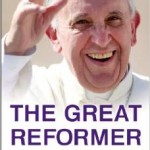It was one year ago today that Pope Benedict XVI announced an action on his part that will resonate for many decades into the future — to long past when we have all passed — and throughout the world.
The Catholic church is relevant to the whole world. It has been for 2000 years, and it will be relevant until the end of time. Decades of social revolution, transitioning moral outlook, broad educational opportunities and excessive materialism (combined with the church’s own heinous sins) had fooled some people into thinking that the church’s relevance had diminished into something at-once quaint and aggravatingly still present, like an old grandparent who has lived past usefulness, won’t die and refuses to remain silent and unseen in the home to which she had been relegated.
Once, while doing volunteer work with aged patients in a senior facility, a rather angry woman who wrote poetry blurted to me, “welcome to the Hotel Omega. The End. The Last Stop for those of us who are living too long, and keeping inheritances from being pissed away.”
I think some had come to see the Church in a similar vein — as a place of last things, stubbornly staying alive and holding on to treasures of principle and interest that a new generation would spend differently.
Seen in that way, the world’s ignorant hatred of Pope Benedict during his reign can be somewhat given a character; a natural world turned in on itself, seeking reflections of itself and increasingly numb to the simple truth that there are “things visible and invisible” (and that what is supernatural is often a truer reality than we can allow ourselves to perceive) could only see Benedict as an impediment to the anticipated windfall of its own relativistic truths finally being acknowledged and celebrated.
Pope Benedict is a fine scholar and professor. He understood that the world had stopped listening and learning. If the Church was a University (which it partly is) its students had stopped attending class and were milling about on the great lawn of the world, tossing frisbees, smoking a bit of weed and talking past each other like forever-sophomores, delighted with all they thought they knew. There was no point, it seemed, in adhering to (or even studying) an old Canon that was presumed to have nothing to say to the age, and was being tossed aside, unlearned.
But the church was still relevant, and Benedict knew it, so he did what a good teacher, who loves his students, will do: He found a way to get their attention, with just a few words. Quickly, the frisbees were put down, the weed was stashed and while a measure of chatter continued, most of the world watched, and wondered, and waited.
Thesis proved: the church remains relevant. Were she not, nothing would have slowed down, a year ago, and things would not seem so fascinating and green and full of promise, a bare year later. We credit that promise to his successor and call it “The Francis Effect”, and it is that.
But Pope Francis himself, knows that he is the fundamental first-effect of Benedict and his action.
The world approves, for now, but it hasn’t yet come to grips with the breadth and depth and width of what Benedict put into motion, a year ago today.
We are in a new semester, the lesson plan has been revised but the books have not. We will be unpacking the Benedict effect — no matter what we call it — for generations to come.
Let us take a moment to pray for Francis, and for Benedict, and for a Church that continues to be relevant and has begun to flourish again.
Yet the world and its enticement are passing away. But whoever does the will of God remains forever. – 1 John 2:17
The Church is not going anywhere.
“. . .we find ourselves in a strange situation: we have no choice but to speak of love if we are not to betray God and man, but it is almost impossible to do so because our language has already betrayed love so often. In such a situation, our help must come from without. God speaks to us of love; “Holy Scripture” which is God’s word cast in human words, raises the word, as it were, out of the dust, purifies it and restores it to us, cleansed. Scripture makes it shine again by placing it at the source of its luminosity — in the mystery of Jesus Christ. From the Cross the word love recovers its uniqueness. Men need more than just grasping and holding; they need understanding, which gives power to their actions and their hands; they also need perception, hearing, reason that reaches to the bottom of the heart. And only when understanding remains open to reason, which is greater that it is, can it be genuinely rational and acquire true knowledge. If you do not love, you do not know (cf. 1 John 4:8). Joseph Cardinal Ratzinger, Homily, 1985, from Co-Workers of the Truth
Related:
John Allen: How Benedict Set the Stage for Pope Francis
Rocco Palmo: Benedict, One Year On
Matthew Bunson: The Year of Two Popes
Fr. Longenecker: Eyewitness Account of the Resignation












